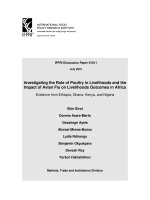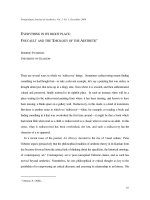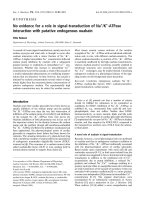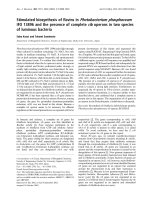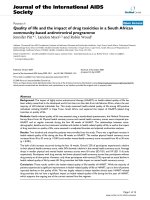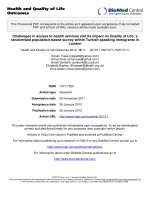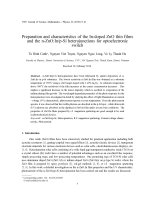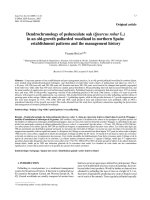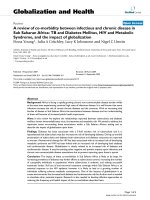Singapores role in indonesias confrontation of malaysia and the impact of confrontation on singapore indonesia relations 2
Bạn đang xem bản rút gọn của tài liệu. Xem và tải ngay bản đầy đủ của tài liệu tại đây (128.32 KB, 3 trang )
i
Summary
This dissertation examines Indonesia’s Confrontation policy against Malaysia from
the perspective that it was a significant event to the re-organisation and development
of the international relations of Southeast Asian post-colonial states, with a special
focus on the Indonesia-Singapore relationship. This analysis is important because,
first, Confrontation has been largely examined from the domestic political and
British/Commonwealth forces strategic points of view, which, while are crucial angles
from which to understand the conflict, nonetheless do not provide a sufficient account
of the logic and motivations of the Southeast Asian political elites who were key
personalities in affecting how the conflict developed and affected the conduct of
international relations among Southeast Asian states. Second, the extent to which
Confrontation shaped Singapore-Indonesia relations has been relatively under-studied.
However, this is an important issue because Singapore played a significant role in
shaping the development of Confrontation, which therefore influenced the nature of
bilateral relations before, during and beyond Confrontation. Finally, discourses
surrounding Malaysia’s formation and Confrontation have been largely western-
centric in that the conflict was deemed to be irrational and strange. However, this
dissertation argues that it is through an analysis of Singaporean and Indonesian
perspectives, strategic interests and behaviour with regard to the concept of Malaysia
and Malaysia’s formation that we can understand better why the conflict started and
took the course it did. The period of analysis for this dissertation is from 1957 to
1973. The most important underlying and proximate “causes” for Confrontation from
1957 to 1963 are examined from the perspective that the historical circumstances and
events during that period were, on their own, not determinative, but instead were
played upon by Singaporean and Indonesian interests, thereby predisposing the move
ii
towards Confrontation. From the Singaporean and Indonesian political leaderships’
perspective, the main issue in Confrontation was the contest over Malaysia’s “moral
personality”, which centred on the question of whether Malaysia was formed out of
the free will of its inhabitants or whether it was a post-colonial state foisted upon
them. However, while the contest over Malaysia’s right to exist was to a large extent
couched in moral terms, there were, simultaneously, other strategic interests being
pursued by both the Singaporeans and Indonesians under the cover of the moral
argument. This two-pronged pursuit of moral ideals and strategic interests was played
out in the political, military, economic and diplomatic fronts of Confrontation, which
also reflects the move towards the closure of the conflict. In addition, Singapore’s
separation from Malaysia, which was to a large extent provoked by the PAP
leadership, was a wildcard which provided the impetus towards the resolution of
Confrontation. Finally, this dissertation examines how Confrontation affected the re-
organisation of Singapore-Indonesia relations in the years 1965 to 1973 in the form of
enduring lessons learnt about the other from the experience of the Confrontation
years.
iii
List of Abbreviations
ABRI: Angkatan Bersenjata Republik Indonesia
ANRI: Arsip Nasional Republik Indonesia
ASA: Association of Southeast Asia
ASEAN: Association of Southeast Asian Nations
BPKI: Badan Penjelidik Kemerdekaan Indonesia (Indonesian Independence
Investigatory Body)
BS: Barisan Sosialis/Barisan
GESTAPU: September 30
th
Movement/Coup
KMM: Kesatuan Melayu Muda (Young Malays’ Association)
KOSTRAD: Komando Cadangan Strategis Angkatan Darat (Army Strategic Reserve
Command)
MPRS: Majelis Permusyawaratan Rakyat Sementara (Provisional People’s
Consultative Assembly)
MSCC: Malaysia Solidarity Consultative Committee
NAA: National Archives of Australia
NAS: National Archives of Singapore
NECOLIM: Neo-colonialism, Colonialism and Imperialism
NEFOS: New Emerging Forces
OHC: Oral History Centre
OLDEFOS: Old Established Forces
PAP: Peoples’ Action Party
PKI: Partai Kommunis Indonesia/Indonesian Communist Party
PKM: Partai Kommunis Malaya/Communist Party of Malaya
PNI: Partai Nasionalis Indonesia/Indonesian Nationalist Party
PRB: Partai Rakyat Brunei
SAF: Singapore Armed Forces
SPA: Singapore People’s Alliance
UMNO: United Malays’ National Organisation
UN: United Nations
